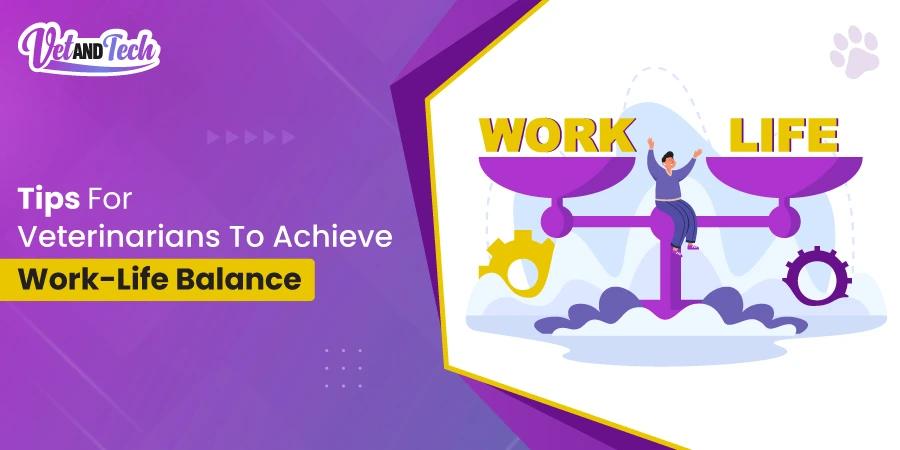7 Practical Tips to Help Veterinarians Achieve Work-Life Balance
Being a veterinarian is one of the most rewarding careers, but also one of the most challenging. Extensive working hours, emotional rollercoaster of highs and lows, and life-or-death decisions can severely drain one's personal life.
Work-life balance, therefore, is not merely pleasant to have—it's crucial. It keeps you energized, emotionally sound, and committed to your job. Without it, even the most passionate veterinarian can burn out.
Here are seven doable, realistic tips to help you regain your balance and feel good inside and outside the clinic.
1. Know When to Switch Off
With emergencies cropping up at any time, it's easy to feel like you're always "on." You may find yourself checking messages after hours or replaying a challenging case in your head at 2 a.m.
But being available at all times isn't viable.
Here's what works:
- Establish strong work hours and let your team know them.
- Silence work app notifications once you are clocked out.
- Establish a shutdown ritual, such as putting on different clothes or taking a few minutes to walk outside after work, to help log out mentally.
Shutting off doesn't mean you're less dedicated; it provides the freedom to return refreshed the next day.
2. Create a Schedule That Works for You
Not everyone has the same 9-to-5 lifestyle. You may be a parent, or you might work better at night. A strict schedule creates stress that bleeds over into your social life.
Flexible schedules are lifesavers for veterinarians. Flexibility is the oxygen you need, whether shorter shifts, longer gaps between rotations, or a four-day workweek.
If your current practice can't provide this, try asking:
- Can I work part-time or alternate days?
- Is job sharing a possibility?
- Are weekend rotations negotiable?
- When your schedule suits your life, balance is a whole lot simpler.
3. Prioritize Self-Care Every Week
The veterinary industry is stressful. You're frequently the calm voice amid chaos, and that drains you. That's why self-care is not a choice, but a necessity. You don't need an expensive getaway or a day at the spa. Find space for small habits that replenish you:
- Take actual lunch breaks rather than consuming food while taking notes.
- Do one thing every day that brings you joy, such as reading, walking your pet, or gardening.
- Don't say yes when you mean no. Say no without feeling any guilt.
- Caring for yourself is not selfish—it's necessary.
4. Choose the Right Work Environment
A veterinary working environment has an enormous impact on general well-being. You might adore medicine and animals more than anything else, but if your clinic is toxic or unsupportive, it will drain your life.
Ask yourself:
- Do I feel respected and heard by my team?
- Is there mutual support across difficult shifts?
- Am I perpetually overwhelmed by impossible caseloads?
If the responses cause concern, then it is time to look elsewhere.
Healthy clinics:
- Reward breaks, do not penalize them.
- Monitor mental health.
- Make flexible schedules work when things are complicated outside of work.
- You deserve a place that nurtures, not undermines, your well-being.
5. Investigate Relief Work
Not all veterinarians desire a traditional full-time position. Some need independence, diversity, or the luxury of working seasonally. That’s where relief veterinarians come in.
As a relief veterinarian, you can:
- Select your shifts
- Work in a variety of clinics
- Get time off between assignments
It's perfect if you're back into the business after a break, require extra control over your schedule, or just don't wish to make a long-term commitment.
Yes, changing venues can be a drag, but relief work is the ultimate way for many veterinarians to return to personal freedom.
Looking for opportunities to make a difference? Explore available relief jobs here at Pago and be part of the change.
6. Work Smarter Using Technology
Outdated systems can hold you back and add unnecessary frustration. Searching for paper files, wrangling disorganized schedules, or tolerating inadequate communication tools takes time and your sanity.
Get with the times:
- Utilize cloud-based scheduling platforms
- Maintain digital medical records
- Streamline reminders and follow-ups
If you're looking for a veterinary job, inquire about potential employers' technology. A contemporary clinic that leverages modern technology indicates that it cares about productivity and your time. Explore Pago to find flexible jobs.
Good technology won't eliminate the human element, but it will let you spend more time with pets and less time with paperwork.
7. Work with People Who Lift You Up
Even the most difficult days are better when you get to spend them around good people.
Whether you're a new graduate or an old pro, your team culture is more important than you realize.
You need a team that:
- Communicates openly
- Shares responsibilities
- Respect days off
- Laugh together, even on bad days
Toxic coworkers or unsupportive leadership can make any job unbearable. But with a healthy, uplifting team, that’s where real balance begins.
Finding Work-Life Balance Begins with the Right Fit
Sometimes, you’re doing everything right, but the job just isn’t working for you. That's where platforms such as Pago step in. They connect veterinarians with clinics that prioritize work-life balance, flexible schedules, and healthy workplaces.
Whether you require relief work, a full-time job, or something in between, Pago helps you find employment that fits your life, and not the other way around. Success in your career begins with finding the right place to achieve it. And if you’re ready to explore practical strategies to protect your well-being, the Finding Work-Life Balance Webinar offers valuable guidance designed specifically for veterinary professionals.
Work-life balance doesn't equal caring less; it means caring smarter. It's about respecting your needs, guarding your energy, and creating a life that nourishes you, not just your role. Not every shift needs to be in survival mode.
Begin small:
- Leave on time
- Take that full lunch break
- Say no when necessary
- Ask for flexibility
You're not just a veterinarian. You're an entire person—with passion, people, and a life worth defending.
So set that boundary, breathe deeper, and take a step toward balance. You’ve earned it.
FAQs
1. Why is work-life balance important for veterinarians?
Because without work-life balance, vets face burnout, emotional fatigue, and even health issues. Balance keeps your passion alive and your mental health intact.
2. What is flexible scheduling in veterinary medicine?
A flexible schedule means having options like part-time roles, custom shifts, or alternate workdays to match your personal needs.
3. How is a veterinary working environment healthy?
Supportive leadership, realistic caseloads, respect for time off, and open communication.
4. Should I become a relief vet?
Yes, if you desire control of your schedule, like variety, or need a break from standard full-time work.
5. How can I begin to improve my work-life balance today?
Begin small, establish work boundaries, schedule breaks, and communicate your needs to your team







